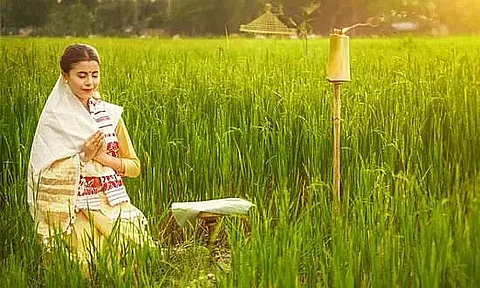
- Home
- Live Blog
- Breaking News
- Top Headlines
- Cities
- NE News
- Sentinel Media
- Sports
- Education
- Jobs

A CELEBRATION PROVIDING PROTECTION TO THE CROPS
Observed every year in the month of October, Kati Bihu is a celebration enjoyed by the Assamese people, including numerous tribes and communities.
Continue reading to explore more about Kati Bihu, the reason behind its celebration, its importance, and many more.
ABOUT:
The festival of Bihu is the most important one celebrated by the Assamese people in the Indian state of Assam. It consists of the three variants, including - Rongali or Bohag Bihu observed in April, Kongali or Kati Bihu observed in October and Bhogali or Magh Bihu observed in January. These three Bihus are celebrated by all Assamese people irrespective of religion, caste or creed. It is also celebrated overseas by all the Assamese diaspora community living worldwide.
Through the three Bihu festivals, the people of Assam celebrate reverence for Krishna, cattle (Goru Bihu) elders in family and fertility of the crops. Also, the celebrations and rituals reflect influences from Southeast Asia and Sino-Tibetan cultures.
This Assamese festival is one of the three significant Bihus of Assam and it has a different flavour as there is less merriment and the atmosphere has a sense of constraining and solemnity. During this time of the year, the paddy in the fields are in the growing stage and as such, the granaries of the farmers are almost empty.
The rituals of the Kati Bihu celebration include the Assamese women wearing the traditional Gamusas and are seen lighting the earthen lamps called "saki" in the paddy fields, in the granary, and also in the garden (bari). Today, even the womenfolk living in the towns and cities offer their prayers and follow the same rituals in front of a Tulsi plant by singing religious hymns and then later distributing "prasad" amongst the family members and neighbours.
In ancient times, these earthen lamps were lit all around the paddy fields, in order to attract the insects, thus acting as a natural insecticide. They did so to protect the maturing paddy. Also, the cultivators whirled a piece of bamboo and would recite rowa-khowa chants and spells to ward off the pests and the evil eye.
Kati Bihu is known as "Kati Gasa" by the Bodo people and "GathiSainjora" by the Dimasa people. The Bodo people in Assam too celebrate the festival with great devotion and fervour. They light lamps at the foot of the "Siju" tree scientifically known as "Euphorbia Neriifolia" tree.
Kati Bihu is also associated with the lighting of "AkaxiGonga" or "Akaxbonti" (lamps) at the tip of a tall bamboo pole. They do so, in order to show the souls of the deceased ones the way to heaven. This has been a long-running practice in the Kati Bihu's celebration.
REASON BEHIND THE KATI-BIHU CELEBRATION:
The Kati Bihu is a sombre and thrifty one and is an animistic festival as it is associated with crop protection and worship of plants and crops. It is celebrated to ask blessings of the natural deities for a good harvest and primarily for the protection of their crops. The celebration is a result of the belief of the people of Assam, that it is nature, who shall protect and give growth to the maturing paddy and so, through the celebration of Kati Bihu the people show their gratefulness and admiration towards Nature.
IMPORTANCE OF THE KATI-BIHU CELEBRATION FOR THE YOUNG GENERATION:
The festival teaches the youth to be kind, respectful and loving towards their culture, traditions and practices, teaching them to expand and develop these aspects in a positive manner, to help their communities grow and to further save these age-old customs from being washed away. The festival signifies love and dedication towards Nature, thus teaching the youth to grow love and care towards Mother Nature and towards all her provisions for the human beings.
KEY LEARNING FROM THEKATI-BIHUCELEBRATION:
Assam is a land full of vivid festivals, colourful culture and unity of the various tribes and religions. Thus, a powerful festival like Bihu enhances and extends this bond of unity among all, spreading joy and merriment. Kati Bihu is a pagan celebration, where the Assamese people worship the elements in nature, hoping for a better and successful harvest and protection for their crops. The celebration teaches not only about the culture and customs of the people, but also about their spirituality and belief in Nature and her powers. Thus, the celebration of Kati Bihu helps one to come closer to nature and to all of its elements.
Video Links: